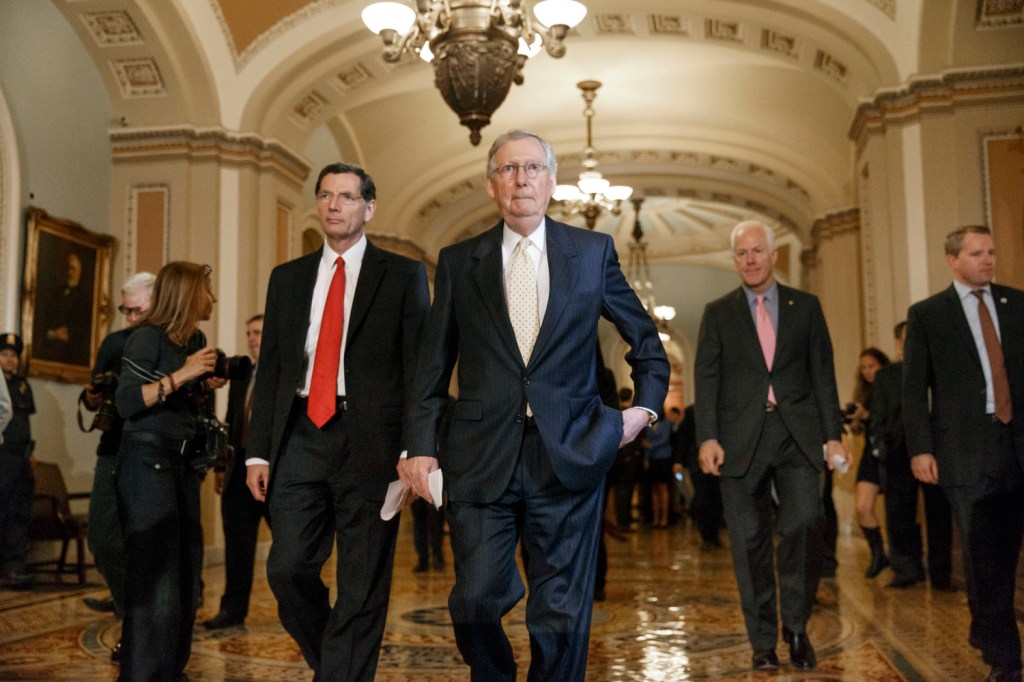WASHINGTON – On the eve of an election that will decide the Senate majority, it’s time for closing arguments and an all-out effort to motivate people to vote.
Republicans have claimed new momentum in midterm campaigns that have centered on President Barack Obama, who is not on Tuesday’s ballot. Under the weight of the unpopular president, Democrats are fighting to distance themselves from the White House and convince voters they deserve to maintain the Senate majority for the final two years of Obama’s presidency. The GOP is sounding confident that it will take Senate control.
Obama has avoided the nation’s most competitive contests in recent weeks, but encouraged Democrats to reject Republican cynicism during campaign stops in Connecticut and Pennsylvania for Democrats in governors’ races. He was scheduled to spend Monday in private meetings with his economic team and Federal Reserve Chair Janet Yellen.
“Despite all the cynicism America is making progress,” Obama said as he implored Democrats in Connecticut to vote. “Don’t stay home. Don’t let somebody else choose your future for you.”
Meanwhile, GOP officials from Alaska to Georgia have seized on the president’s low approval ratings, which have overshadowed an election season in which roughly 60 percent of eligible voters are expected to stay home.
“This is really the last chance for America to pass judgment on the Obama administration and on its policies,” the GOP’s 2012 presidential nominee, Mitt Romney, said in a message echoed by Republicans across the country over the weekend.
While the elections will determine winners in all 435 House districts and in 36 governors’ seats, the national focus is on the Senate, where Republicans need to net six seats to control the majority in the Congress that convenes in January. The GOP already controls the House, and a Senate takeover could dramatically change Obama’s last two years in office.
Republicans appear certain of picking up at least three Senate seats – in West Virginia, Montana and South Dakota. Nine other Senate contests are considered competitive, six of them for seats in Democratic hands.
Democratic Party leaders are predicting victory despite disappointing polls.
Vice President Joe Biden said in an interview to be broadcast on CNN Monday that “I don’t agree with the odds-makers. I predict we’re gonna keep the Senate.”
At the White House, spokesman Josh Earnest said that Obama agreed. In a nod to the president, he said Democrats were backed up by a battle-tested get-out-the-vote strategy that could boost their candidate by 2 or 3 percentage points on Election Day.
“Those strategies are rooted in strategies that were successfully implemented by the president’s team in the context of his re-election campaign,” Earnest said.
And the chair of the Democratic Party, Rep. Debbie Wasserman Schultz of Florida, said, “I’m very proud of this president. I think we’re going to win the Senate.”
Democrats have deployed their biggest stars to help preserve their endangered Senate majority.
In New Hampshire, former secretary of state Hillary Rodham Clinton headlined a rally for Gov. Maggie Hassan and Sen. Jeanne Shaheen, a Democrat locked in a tough re-election battle against former Massachusetts Sen. Scott Brown.
Clinton, who is weighing a 2016 presidential bid, charged that Republicans are running a campaign of fear.
“Fear is the last resort for those who have run out of ideas and hope,” she said Sunday in her first appearance in New Hampshire since October 2008.
Many voters will have already cast ballots by the time polls open Tuesday.
At least 16.7 million people have voted so far across 31 states, according to early voting data monitored by The Associated Press. Arkansas, Florida, Georgia, Iowa, Louisiana, Maryland, Montana, North Carolina, Wisconsin and Utah already surpassed their 2010 advance totals.
Both sides have claimed partial victory, although party registration is divided about equally among those who have already cast ballots.
While the campaigns’ costly voter turnout operations were in full swing, large percentages of younger voters and minorities – groups that typically support Democrats – are expected to sit out the elections altogether.
None of the last four midterm elections drew more than 38 percent of the voting-age population.
Send questions/comments to the editors.



Success. Please wait for the page to reload. If the page does not reload within 5 seconds, please refresh the page.
Enter your email and password to access comments.
Hi, to comment on stories you must . This profile is in addition to your subscription and website login.
Already have a commenting profile? .
Invalid username/password.
Please check your email to confirm and complete your registration.
Only subscribers are eligible to post comments. Please subscribe or login first for digital access. Here’s why.
Use the form below to reset your password. When you've submitted your account email, we will send an email with a reset code.